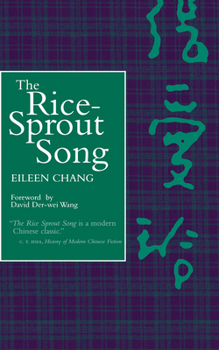The Rice Sprout Song
Select Format
Select Condition 
Book Overview
The first of Eileen Chang's novels to be written in English, The Rice-Sprout Song portrays the horror and absurdity that the land-reform movement brings to a southern village in China during the early 1950s. Contrary to the hopes of the peasants in this story, the redistribution of land does not mean an end to hunger. Man-made and natural disasters bring about the threat of famine, while China's involvement in the Korean War further deepens the peasants'...
Format:Paperback
Language:English
ISBN:0520210883
ISBN13:9780520210882
Release Date:August 1998
Publisher:University of California Press
Length:182 Pages
Weight:0.50 lbs.
Dimensions:0.5" x 5.0" x 7.9"
Related Subjects
Contemporary Fiction Foreign Language Fiction Humanities Literature Literature & FictionCustomer Reviews
4 ratings
Eileen Chang is the greatest
Published by Thriftbooks.com User , 20 years ago
Another one of Eileen Chang's translations of her Chinese works, this is an excellent novel about China's farmers and the struggles they encounter as a result of Maoism in China. This is my second favorite novel of hers, behind Naked Earth. Unlike the latter, The Rice-Sprout Song is much easier to find, and now includes an excellent introduction by David Wang.
Lessons for today from Maoist China
Published by Thriftbooks.com User , 22 years ago
The Old Master who collected Chinese wisdom in Tao Te Ching some 2,500 years ago wrote pithily: "The sage never has a mind of his own; He considers the minds of the common people to be his mind."Today, he would not change a word for the sage: the sheng-jen in Beijing. True, modern China, a colossus of 1.2 billion people, is fronted by Shanghai and other booming, skyscrapered, fiber-opticked, globally connected metropolises. But beyond the urban fronts, reality is 900 million peasants--75% of the total population--living a rural, feudal life with Marxist trappings. What gives the Beijing mandarin insomnia is not rhetorical exchanges with America like we saw earlier in 2001. No, it's much more the primal fear bad weather and bad crops might visit hunger upon the 900 million--if the peasants go hungry, the government goes down and chaos surely follows. Chaos, for the Chinese mind, being anathema (off the Tao, hindering wu-wei).The Rice-Sprout Song by Eileen Chang (1920-95), first published in 1955, deftly evokes rural Chinese life in the early days of the Maoist Revolution. Though well known to Chinese readers everywhere, Chang's work has only recently been in print again for English readers. In 1998, three years after her death, the University of California reissued this novel and a companion work, The Rouge of the North.Chang, a giant in Chinese literature, wrote and lived a self-proclaimed aesthetic of desolation, especially after immigrating to the United States in the mid-Fifties. A Garbo-esque recluse, Chang was found dead in a barren Hollywood, California, studio apartment. Her will asked that her body be "cremated instantly, the ashes scattered in any desolate spot, over a fairly wide area, if on land." If Chang, as she said, was haunted by thoughts of desolation, then The Rice-Sprout Song shows a corollary to her artistic hunger: Her writing transcends any simple, obvious political interpretation of her material. Neither pro-Mao nor anti-Mao, but a literary meditation on peasant lives caught up in the ironies of political will and human need when hunger stalks the countryside.The Rice-Sprout Song gets underway with a common family event: a wedding. Gold Flower of T'an Village will marry Plenty Own Chou of neighboring Chou Village. This might not be a joyous occasion for Chang begins to summon the isolation and loneliness of village life: "Sunlight lay across the street like an old yellow dog, barring the way. The sun had grown old here." Yes, even that universal restorer of the spirit--the sun--can be menacing. That all is not right when the festive wedding occasion arrives is shown by note of the "inferior food" that of necessity is served. Big Uncle complains that he cannot see the rice in his bowl of watery gruel. This jho mush--anything but solid rice--becomes one thematic particular for hunger that haunts this novel.If Chang were less an artist, the reader's easy-to-hate nemesis would be Comrade Wong, the kan pu of T'an Village, the lo
The book is very good!
Published by Thriftbooks.com User , 24 years ago
I am like The Rice Sprout Song.Eileen chang is the greatest writer of China.
Sparse, Stunning Language - A Great & Tragic Story
Published by Thriftbooks.com User , 25 years ago
Rice Sprout Song is possibly the best work of literature I have ever read. It was first recommended to me as descriptive of the collectivization era shortly after the 1949 Revolution in China, a classic tale between the state and the individual. It is a spellbinding, troubling work, and is almost impossible to believe that it was Eileen Chang's first work in English. The language she uses is sparse, beautiful and conveys greatest impact after the last page is read, and the cover closed. It is more than an interesting story about conflict between the state and the individual. It is an unsettling story of physical starvation and the death of hope and love.





